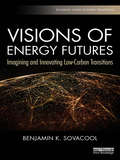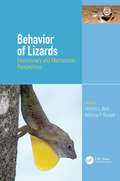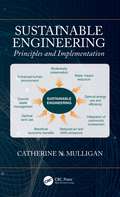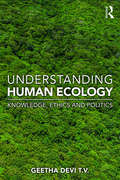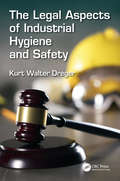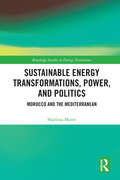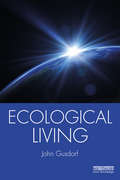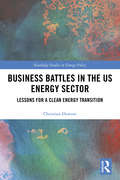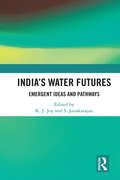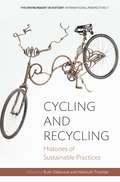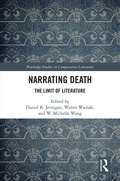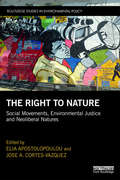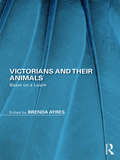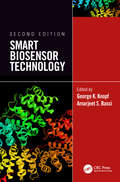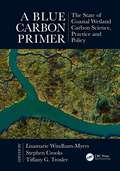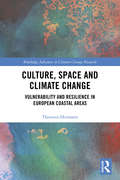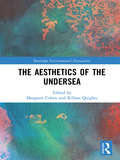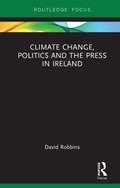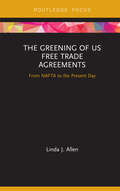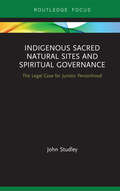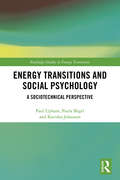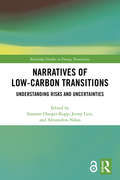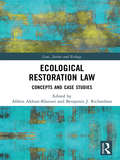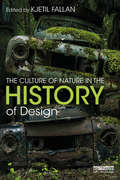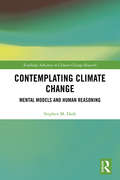- Table View
- List View
Visions of Energy Futures: Imagining and Innovating Low-Carbon Transitions (Routledge Studies in Energy Transitions)
by Benjamin K. SovacoolThis book examines the visions, fantasies, frames, discourses, imaginaries, and expectations associated with six state-of-the-art energy systems—nuclear power, hydrogen fuel cells, shale gas, clean coal, smart meters, and electric vehicles—playing a key role in current deliberations about low-carbon energy supply and use. Visions of Energy Futures: Imagining and Innovating Low-Carbon Transitions unveils what the future of energy systems could look like, and how their meanings are produced, often alongside moments of contestation. Theoretically, it analyzes these technological case studies with emerging concepts from various disciplines: utopianism (history of technology), symbolic convergence (communication studies), technological frames (social construction of technology), discursive coalitions (discourse analysis and linguistics), sociotechnical imaginaries (science and technology studies), and the sociology of expectations (innovation studies, future studies). It draws from these cases to create a synthetic set of dichotomies and frameworks for energy futures based on original data collected across two global epistemic communities— nuclear physicists and hydrogen engineers—and experts in Eastern Europe and the Nordic region, stakeholders in South Africa, and newspapers in the United Kingdom. This book is motivated by the premise that tackling climate change via low-carbon energy systems and practices is one of the most significant challenges of the twenty-first century, and that success will require not only new energy technologies, but also new ways of understanding language, visions, and discursive politics. The discursive creation of the energy systems of tomorrow are propagated in polity, hoping to be realized as the material fact of the future, but processed in conflicting ways with underlying tensions as to how contemporary societies ought to be ordered. This book will be essential reading for students and scholars of energy policy, energy and environment, and technology assessment.
Behavior of Lizards: Evolutionary and Mechanistic Perspectives
by Vincent Bels Anthony RussellKey features: Presents a contemporary snapshot of the mechanisms underlying the evolution and adaptation of behavior Explores how genetics, epigenetics, development, and environment shape behavior Discusses a broad range of behavioral repertoires and responses, including those related to thermoregulatory, foraging, predatory, displaying, social and escape strategies. Examines physiological and sensory mechanisms Covers the effects of various aspects of global change on behavior, with chapters that focus on the impacts of climate change on hydroregulatory behavior and behavioral responses to the effects of habitat alteration resulting from human-mediated change and colonization by invasive species. Lizards serve as focal organisms for many of biological questions related to evolution, ecology, physiology, and morphology. They are studied at multiple spatial and temporal scales, from the individual to the community level. This book, authored by expert contributors from around the world, explores behaviors underlying the evolution and adaptation of these organisms. It covers conceptual, empirical, and methodological approaches to the understanding of the role that natural and sexual selection play in molding the behavioral traits of lizards. This thorough, illustrated reference should stimulate discussion of the conceptual and methodological approaches for studying the behavioral traits of these fascinating and highly diverse vertebrates.
Sustainable Engineering: Principles and Implementation
by Catherine MulliganSustainable Engineering: Principles and Implementation provides a comprehensive overview of the interdisciplinary field of sustainability as it applies to engineering and methods for implementation of sustainable practices. Due to increasing constraints on resources and on the environment and effects of climate change, engineers are being faced with new challenges. While it is generally believed that the concepts of sustainable design must be adhered to so that future generations may be protected, the execution and practice of these concepts are very difficult. It is therefore the focus of this book to give both a conceptual understanding as well as practical skills to apply sustainable engineering principles to engineering design. This book introduces relevant theory, principles, and ethical expectations for engineers, presents concepts related to industrial ecology, green engineering, and eco-design, and details frameworks that indicate the challenges and constraints of applying sustainable development principles. It describes the tools, protocols, and guidelines that are currently available through case studies and examples from around the world. The book is designed to be used by undergraduate and graduate students in any engineering program (with particular emphasis on civil, environmental and chemical engineering) and other programs in which sustainability is taught, in addition to practicing scientists and engineers and all others concerned with the sustainability of products, projects and processes. Specific Features: Discusses sources of contaminants and their impact on the environment Addresses sustainable assessment techniques, policies, protocols and guidelines Describes new tools and technologies for achieving sustainable engineering Includes social and economic sustainability dimensions Offers case studies demonstrating implementation of sustainable engineering practices
Understanding Human Ecology: Knowledge, Ethics and Politics
by Geetha Devi T. V.This book examines the domain of human agency–environment interaction from a multidimensional point of view. It explores the human–environment interface by analysing its ethical, political and epistemic aspects – the value aspects that humans attribute to their environment, the relations of power in which the actions and their consequences are implicated and the meaning of human actions in relation to the environment. The volume delineates the character of this domain and works out a theoretical framework for the field of human ecology. This book will be a must-read for students, scholars and researchers of environmental studies, human ecology, development studies, environmental history, literature, politics and sociology. It will also be useful to practitioners, government bodies, environmentalists, policy makers and NGOs.
The Legal Aspects of Industrial Hygiene and Safety (Sustainable Improvements in Environment Safety and Health)
by Kurt W. DregerThe Legal Aspects of Industrial Hygiene and Safety explores various legal issues that are often encountered by Industrial Hygiene and Safety managers during their careers. A description is presented of the various legal concepts and processes that often arise in the IH/S practice, including tort, contract, and administrative law. The goal is to provide IH/S managers with sufficient knowledge to be able to incorporate legal risk analysis into everyday decision-making and policy development. This book will explore the legal issues that arise in IH/S practice and will be helpful to new IH/S managers as they progress in their careers. FEATURES Explores various legal issues that are often encountered by Industrial Hygiene and Safety managers during their careers Provides insight into the legal issues and processes to IH/S managers that are traditionally only available to attorneys Improves the IH/S managers' ability to communicate complex IH/S issues to in-house counsel Presents tools and knowledge to IH/S managers so they can better consider the legal risks of the decisions they make Covers various legal concepts and processes that can arise in the IH/S practice, including tort, contract, and administrative law
Sustainable Energy Transformations, Power and Politics: Morocco and the Mediterranean (Routledge Studies in Energy Transitions)
by Sharlissa MooreThis book analyses energy transitions and the opportunities and challenges for building sustainable energy systems to improve human capabilities while protecting the environment. Sufficient and secure energy supply is critical to human thriving and socioeconomic development. Yet energy systems are also implicated in the most pressing socio-environmental challenges of our time - climate change, air pollution, and water and land use. This book examines what is arguably the most ambitious vision for a renewable energy based system worldwide. This vision, often called Desertec, is for a regional electricity system supplying North Africa, Europe, and the Middle East with sustainable and affordable power. The behemoth plan would entail building dozens of large-scale solar and wind power plants mostly in North Africa, interconnecting the fragmented transmission infrastructure of 38 Mediterranean countries, and linking North Africa to the European Union (EU) through undersea transmission cables. Within the Mediterranean, the book focuses on Morocco, which is one of the most advanced developing countries in renewable energy scale-up, to understand its motivations for building renewable energy and the effects on sustainable development. The book therefore takes a unique multi-scalar approach to understanding the social and political aspects of energy transitions, weaving together the views of villagers living near Morocco’s first solar energy zone with the perspectives of national decision-makers in Morocco with the views of European policymakers and major transnational energy companies in the Mediterranean region. This book will be of great interest to students, scholars and policymakers interested in energy transitions, sustainable and renewable energy, Mediterranean politics, sustainable development and environment and sustainability more generally.
Ecological Living
by John GusdorfThis book emphasizes how we already have the technologies available, including renewable energy and the ability to recycle most materials, to make ecological living possible and that perceived barriers to energy transitions can be overcome. Human life relies upon two systems: the biosphere and the system that produces our goods and services. Today, these two systems are in conflict, and we all face the question of whether we can stop damaging our environment while still supplying the essential goods and services we have come to depend on. Ecological Living presents an optimistic vision of our future by showing how decoupling the productive system from resource extraction is possible, and how this is a key means of achieving an equitable world within environmental limits. For long-term sustainability, the book argues that we must become more efficient in the use of our resources so that resource extraction, and the accompanying environmental costs, can be reduced. Demonstrating the essential steps towards a just and sustainable world, Ecological Living will be of great interest to all students, academics, and policymakers working in the field of environment and sustainability.
Business Battles in the US Energy Sector: Lessons for a Clean Energy Transition (Routledge Studies in Energy Policy)
by Christian DownieThis book is ground breaking in its study of business actors in climate and energy politics. While various studies have demonstrated the influence of business actors across multiple policy domains, this is the first to examine the behaviour of business actors in energy centric industries in the US that will be vital for achieving a clean energy transition, namely the oil, gas, coal, utility, and renewable industries. Drawing on almost 80 interviews with senior energy executives, lobbyists, and policymakers, it asks two central questions: (i) how and why are business actors shaping energy policy contests in the US? And (ii) what are the implications for policymakers? In answering these questions, this book provides new insights about the preferences and strategies of business in the energy sector, and, significantly, it identifies strategies for policymakers seeking to regulate energy in the face of political resistance from incumbent fossil fuel industries. This book will be of particular value to students, scholars, and policymakers working in the fields of energy, climate, and environmental politics, as well as individuals generally interested in the role that business exerts over policy processes.
India’s Water Futures: Emergent Ideas and Pathways
by K. J. Joy S. JanakarajanWhen it comes to water, we flush and forget. We use, abuse and almost never recycle. Water sector in India, since the 1990s, has seen some new ideas formalised legally and institutionally, while others are still emerging and evolving. Confronting the reality of current water management strategies, this volume discusses the state of the Indian water sector to uncover solutions that can address the imminent water crises. This book: Analyses the growing water insecurity, increase in demand, inefficiency in water use, and growing inequalities in accessing clean water; Sheds light on water footprint in agricultural, industrial and urban use, pressures on river basin management, depleting groundwater resources, patterns of droughts and floods, watershed based development and waste water and sanitation management; Examines water conflicts, lack of participatory governance mechanisms, and suggests an alternative framework for water regulation and conflict transformation; Highlights the relationship between gender discourse and water governance; Presents an alternative agenda for water sector reforms. This volume, with hopes for a more water secure future, will interest scholars and researchers of development studies, environment studies, public policy, political studies, political sociology, and, NGOs, media and think tanks working in this area.
Cycling and Recycling: Histories of Sustainable Practices (Environment in History: International Perspectives #7)
by Ruth Oldenziel Helmuth TrischlerTechnology has long been an essential consideration in public discussions of the environment, with the focus overwhelmingly on creating new tools and techniques. In more recent years, however, activists, researchers, and policymakers have increasingly turned to mobilizing older technologies in their pursuit of sustainability. In fascinating case studies ranging from the Early Modern secondhand trade to utopian visions of human-powered vehicles, the contributions gathered here explore the historical fortunes of two such technologies—bicycling and waste recycling—tracing their development over time and providing valuable context for the policy successes and failures of today.
Narrating Death: The Limit of Literature
by Daniel K. Jernigan Walter Wadiak Michelle WangDrawing on literary and visual texts spanning from the twelfth century to the present, this volume of essays explores what happens when narratives try to push the boundaries of what can be said about death.
The Right to Nature: Social Movements, Environmental Justice and Neoliberal Natures (Routledge Studies in Environmental Policy)
by Elia Apostolopoulou Jose A. Cortes-VazquezSince the 2008 financial crash the expansion of neoliberalism has had an enormous impact on nature-society relations around the world. In response, various environmental movements have emerged opposing the neoliberal restructuring of environmental policies using arguments that often bridge traditional divisions between the environmental and labour agendas. The Right to Nature explores the differing experiences of a number of environmental-social movements and struggles from the point of view of both activists and academics. This collection attempts to both document the social-ecological impacts of neoliberal attempts to exploit non-human nature in the post-crisis context and to analyse the opposition of emerging environmental movements and their demands for a radically different production of nature based on social needs and environmental justice. It also provides a necessary space for the exchange of ideas and experiences between academics and activists and aims to motivate further academic-activist collaborations around alternative and counter-hegemonic re-thinking of environmental politics. This book will be of great interest to students, scholars and activists interested in environmental policy, environmental justice, social and environmental movements.
Victorians and Their Animals: Beast on a Leash
by Brenda AyresThis book, Victorians and Their Animals: Beast on a Leash, investigates the notion that British Victorians did see themselves as naturally dominant species over other humans and over animals. They conscientiously, hegemonically were determined to rule those beneath them and the animal within themselves albeit with varying degrees of success and failure. The articles in this collection apply posthuman and other theories, including queer, postcolonialism, deconstruction, and Marxism, in their exploration of Victorian attitudes toward animals. They study the biopolitical relationships between human and nonhuman animals in several key Victorian literary works. Some of this book’s chapters deal with animal ethics and moral aesthetics. Also being studied is the representation of animals in several Victorian novels as narrative devices to signify class status and gender dynamics, either to iterate socially acceptable mores or to satirize hypocrisy or breach of behavior or to voice social protest. All of the chapters analyse the interdependence of people and animals during the nineteenth century.
Smart Biosensor Technology
by George K. Knopf Amarjeet S. BassiBased on the success of the first edition, this second edition continues to build upon fundamental principles of biosensor design and incorporates recent advances in intelligent materials and novel fabrication techniques for a broad range of real world applications. The book provides a multi-disciplinary focus to capture the ever-expanding field of biosensors. Smart Biosensor Technology, Second Edition includes contributions from leading specialists in a wide variety of fields with a common focus on smart biosensor design. With 21 chapters organized in five parts, this compendium covers the fundamentals of smart biosensor technology, important issues related to material design and selection, principles of biosensor design and fabrication, advances in bioelectronics, and a look at specific applications related to pathogen detection, toxicity monitoring, microfluidics and healthcare. Features Provides a solid background in the underlying principles of biosensor design and breakthrough technologies for creating more intelligent biosensors Focusses on material design and selection including cutting-edge developments in carbon nanotubes, polymer nanowires, and porous silicon Examines machine learning and introduces concepts such as DNA-based molecular computing for smart biosensor function Explores the principles of bioelectronics and nerve cell microelectrode arrays for creating novel transducers and physiological biosensors Devotes several chapters to biosensors developed to detect and monitor a variety of toxins and pathogens Offers expert opinions on the future directions, challenges and opportunities in the field
A Blue Carbon Primer: The State of Coastal Wetland Carbon Science, Practice and Policy (CRC Marine Science)
by Lisamarie Windham-Myers Stephen Crooks Tiffany G. TroxlerKey features: Captures the historic context and recent developments in science and policy arenas that address the potential for coastal wetlands to be considered as significant contributors to carbon sequestration Links multiple levels of science (biogeochemistry, geomorphology, paleoclimate, etc.) with blue carbon concepts (science, policy, mapping, operationalization, economics) in a single compendium Concludes with a discussion of future directions which covers integrated scientific approaches, impending threats and specific gaps in current knowledge Includes 7 case studies from across the globe that demonstrate the benefits and challenges of blue carbon accounting Written by over 100 leading global blue carbon experts in science and policy. Blue Carbon has emerged as a term that represents the distinctive carbon stocks and fluxes into or out of coastal wetlands such as marshes, mangroves, and seagrasses. The Blue Carbon concept has rapidly developed in science literature and is highly relevant politically, as nations and markets are developing blue carbon monitoring and management tools and policies. This book is a comprehensive and current compendium of the state of the science, the state of maps and mapping protocols, and the state of policy incentives (including economic valuation of blue carbon), with additional sections on operationalizing blue carbon projects and 7 case studies with global relevance.
Culture, Space and Climate Change: Vulnerability and Resilience in European Coastal Areas (Routledge Advances in Climate Change Research)
by Thorsten HeimannWays of handling climate change vary worldwide. Differences can be observed in the perception of potential threats and opportunities as well as in the appraisal of adequate coping strategies. Collective efforts often fail not because of technical restrictions, but as a result of social and cultural differences between the actors involved. Consequently, there is a need to explore in greater depth those zones of cultural friction which emerge when actors deal with climate change. This book examines how cultural differences in the handling of climate change can be described and explained. The work develops the concept of culture as relational space, elaborates explanatory approaches, and investigates them by surveying more than 800 actors responsible for spatial development of the European coastal regions in the Netherlands, Germany, Denmark, and Poland. In doing so, this book engages with debates on cultural globalisation, in which the attachment of culture to place is increasingly being questioned. Adopting the approach of culture as relational space allows possible cultural formations to be examined across diverse fields of application from the local to the global scale. In addition, the book investigates how far different value orientations, beliefs, and identities can explain diverse perceptions of problems and opportunities right up to preferences for climate-mitigation and adaptation measures. Providing comprehensive insights into the diverse zones of cultural friction which scholars and practitioners face when handling climate change locally and globally, this book will be of great interest to those studying climate change, environmental sociology, and sustainable planning.
The Aesthetics of the Undersea (Routledge Environmental Humanities)
by Margaret Cohen Killian QuigleyAmong global environments, the undersea is unique in the challenges it poses – and the opportunities it affords – for sensation, perception, inquiry, and fantasy. The Aesthetics of the Undersea draws case studies in such potencies from the subaqueous imaginings of Western culture, and from the undersea realities that have inspired them. The chapters explore aesthetic engagements with underwater worlds, and sustain a concern with submarine "sense," in several meanings of that word: when submerged, faculties and fantasies transform, confronting human subjects with their limitations while enlarging the apparent scope of possibility and invention. Terrestrially-established categories and contours shift, metamorphose, or fail altogether to apply. As ocean health acquires an increasing share of the global environmental imaginary, the histories of submarine sense manifest ever-greater importance, and offer resources for documentation as well as creativity. The chapters deal with the sensory, material, and formal provocations of the underwater environment, and consider the consequences of such provocations for aesthetic and epistemological paradigms. Contributors, who hail from the United States, United Kingdom and Australia, include scholars of literature, art, new media, music and history. Cases studies range from baroque and rococo fantasies to the gothic, surrealism, modernism, and contemporary installation art. By juxtaposing early modern and Enlightenment contexts with matters of more recent – and indeed contemporary – importance, The Aesthetics of the Undersea establishes crucial relations among temporally remote entities, which will resonate across the environmental humanities.
Climate Change, Politics and the Press in Ireland (Routledge Focus on Environment and Sustainability)
by David RobbinsMedia coverage of climate change has attracted much scholarly attention because the extent of such coverage has an agenda-setting effect and because the ways in which the coverage is framed can influence public perception of and engagement with the issue. However, certain gaps in our understanding of the processes whereby such coverage is produced remain. The competition among strategic actors to influence media framing strategies is poorly understood, and the perspectives of journalists and editors are largely absent from literature. With a view to advancing our understanding of the "frame competition" around climate change and to presenting the perspectives of journalists regarding climate change as a journalistic topic, this book presents an in-depth case history of media coverage of climate change in Ireland. First, the extent of media attention for climate change is established, and the way in which such coverage is framed is also examined. Through a series of interviews, including rare and privileged access to government ministers, their media advisors, and journalists and editors, the book uncovers the contest to establish a dominant framing. The main objective of this book is to advance our understanding of the contest to establish the dominant framing of climate change in the media discourse. Although focussed on Ireland, its conclusions are of value to those seeking to better understand the dynamics of media coverage of climate change in other contexts. This book will be of great interest to students and scholars of climate change, environmental policy, media and communication studies, and Irish politics.
The Greening of US Free Trade Agreements: From NAFTA to the Present Day (Routledge Focus on Environment and Sustainability)
by Linda AllenThis book provides an up-to-date critical analysis of the integration of environmental policies into US free trade agreements. The work focuses on the evolution of the design of environmental policies and analyzes their effectiveness. Starting with the North American Free Trade Agreement (NAFTA) leading to the Trans-Pacific Partnership (TPP), the book examines the history of policy integration. In doing so, it provides an overview of the major trade-related environmental policies and presents empirical research on their effectiveness, a discussion of the continued demand for policy integration in light of the effectiveness, and recommendations for addressing shortcomings. The main objective of the book is to inform the ongoing policy debate over integration of environmental policies into trade agreements. The current renegotiation of NAFTA provides an opportune time for undertaking this critical review of trade-related environmental policies. As our understanding and knowledge of the environmental policies associated with US trade agreements, in particular for NAFTA, has grown significantly over the past twenty-five years, this book provides a timely and critical update for this policy debate. Students and scholars of environmental law, trade and economics, and specifically US trade, environmental policy and law will find this book of great interest.
Indigenous Sacred Natural Sites and Spiritual Governance: The Legal Case for Juristic Personhood (Routledge Focus on Environment and Sustainability)
by John StudleySince time immemorial indigenous people have engaged in legal relationships with other-than-human-persons. These relationships are exemplified in enspirited sacred natural sites, which are owned and governed by numina spirits that can potentially place legal demands on humankind in return for protection and blessing. Although conservationists recognise the biodiverse significance of most sacred natural sites, the role of spiritual agency by other-than-human-persons is not well understood. Consequently, sacred natural sites typically lack legal status and IUCN-designated protection. More recent ecocentric and posthuman worldviews and polycentric legal frameworks have allowed courts and legislatures to grant 'rights' to nature and 'juristic personhood' and standing to biophysical entities. This book examines the indigenous literature and recent legal cases as a pretext for granting juristic personhood to enspirited sacred natural sites. The author draws on two decades of his research among Tibetans in Kham (southwest China), to provide a detailed case study. It is argued that juristic personhood is contingent upon the presence and agency of a resident numina and that recognition should be given to their role in spiritual governance over their jurisdiction. The book concludes by recommending that advocacy organisations help indigenous people with test cases to secure standing for threatened sacred natural sites (SNS) and calls upon IUCN, UNESCO (MAB and WHS), ASEAN Heritage and EuroNatura to retrospectively re-designate their properties, reserves, parks and initiatives so that SNS and spiritual governance are fully recognised and embraced. It will be of great interest to advanced students and researchers in environmental law, nature conservation, religion and anthropology.
Energy Transitions and Social Psychology: A Sociotechnical Perspective (Routledge Studies in Energy Transitions)
by Paul Upham Paula Bögel Katinka JohansenThis book explains how social psychological concepts can be closely integrated with sociotechnical perspectives of energy transitions. It shows the value of actor-centred analysis that acknowledges the role of individual-level processes within their wider contexts of energy supply and use. In this way, the book connects social psychological and sociological frames of analysis, preserving the value of both, to provide multi-level, analytically extended accounts of energy transitions processes. Sociotechnical thinking is about the interactions of people and technology, including the rules, regulations and institutions involved. Such perspectives help to identify the many forms of path dependency that can make change difficult. Human behaviour plays a strong role in maintaining these path dependencies, but it can also introduce change. This book advocates a deliberately interdisciplinary research agenda that recognises the value of social psychological perspectives when seeking to create new pathways for energy supply and use. At the same time, it also demonstrates the value of sociotechnical perspectives for energy-related social psychology. Energy Transitions and Social Psychology will be of great interest to students and scholars of energy transitions, environmental and energy psychology, sustainable development and innovation studies, as well as students and scholars of environment and energy more generally.
Narratives of Low-Carbon Transitions: Understanding Risks and Uncertainties (Routledge Studies in Energy Transitions)
by Susanne Hanger-Kopp Jenny Lieu Alexandros Nikas"The Open Access version of this book, available at https://doi.org/10.4324/9780429458781, has been made available under a Creative Commons Attribution-Non Commercial-No Derivatives 4.0 license." This book examines the uncertainties underlying various strategies for a low-carbon future. Most prominently, such strategies relate to transitions in the energy sector, on both the supply and the demand side. At the same time they interact with other sectors, such as industrial production, transport, and building, and ultimately require new behaviour patterns at household and individual levels. Currently, much research is available on the effectiveness of these strategies but, in order to successfully implement comprehensive transition pathways, it is crucial not only to understand the benefits but also the risks. Filling this gap, this volume provides an interdisciplinary, conceptual framework to assess risks and uncertainties associated with low-carbon policies and applies this consistently across 11 country cases from around the world, illustrating alternative transition pathways in various contexts. The cases are presented as narratives, drawing on stakeholder-driven research efforts. They showcase diverse empirical evidence reflecting the complex challenges to and potential negative consequences of such pathways. Together, they enable the reader to draw valuable lessons on the risks and uncertainties associated with choosing the envisaged transition pathways, as well as ways to manage the implementation of these pathways and ultimately enable sustainable and lasting social and environmental effects. This book will be of great interest to students, scholars, and practitioners of environmental and energy policy, low-carbon transitions, renewable energy technologies, climate change action, and sustainability in general.
Ecological Restoration Law: Concepts and Case Studies (Law, Justice and Ecology)
by Afshin Akhtar-Khavari Benjamin J. RichardsonEcological restoration is as essential as sustainable development for the health of the biosphere. Restoration, however, has been a low priority of most countries' environmental laws, which tend to focus narrowly on rehabilitation of small, discrete sites rather than the more ambitious recovery of entire ecosystems and landscapes. Through critical theoretical perspectives and topical case studies, this book's diverse contributors explore a more ambitious agenda for ecological restoration law. Not only do they investigate current laws and other governance mechanisms; they also consider the philosophical and methodological bases for the law to take ecological restoration more seriously. Through exploration of themes relating to time, space, geography, semiotics, social justice, and scientific knowledge, this book offers innovative and critical insights into ecological restoration law.
The Culture of Nature in the History of Design
by Kjetil FallanThe Culture of Nature in the History of Design confronts the dilemma caused by design’s pertinent yet precarious position in environmental discourse through interdisciplinary conversations about the design of nature and the nature of design. Demonstrating that the deep entanglements of design and nature have a deeper and broader history than contemporary discourse on sustainable design and ecological design might imply, this book presents case studies ranging from the eighteenth to the twenty-first century and from Singapore to Mexico. It gathers scholarship on a broad range of fields/practices, from urban planning, landscape architecture, and architecture, to engineering design, industrial design, furniture design and graphic design. From adobe architecture to the atomic bomb, from the bonsai tree to Biosphere 2, from pesticides to photovoltaics, from rust to recycling – the culture of nature permeates the history of design. As an activity and a profession always operating in the borderlands between human and non-human environments, design has always been part of the environmental problem, whilst also being an indispensable part of the solution. The book ventures into domains as diverse as design theory, research, pedagogy, politics, activism, organizations, exhibitions, and fiction and trade literature to explore how design is constantly making and unmaking the environment and, conversely, how the environment is both making and unmaking design. This book will be of great interest to a range of scholarly fields, from design education and design history to environmental policy and environmental history.
Contemplating Climate Change: Mental Models and Human Reasoning (Routledge Advances in Climate Change Research)
by Stephen M. DarkGlobal climate change policy has failed us all, but what is the reasoning that underlies this failure? Why are some people more disposed to reflect on confounding issues like climate change, recognise the danger, seek a solution, and act accordingly, more than others? This book is concerned with how we think and act in response to climate change. In particular, faced with deep uncertainty and the multifaceted complexities that characterise the climate change conundrum, how the various actors and institutions involved in the policymaking process make decisions that both aid and impede in the design and implementation of climate change policy. This book focuses on how these actors and institutions frame and use the knowledge available – under conditions of competing ideologies and interests – and synthesise it to form often-disparate mental models, or worldviews, that inspire them to become firm advocates of meaningful climate change action or indeed, sceptics that continue to downplay the threat, and hence the need for urgency. By exploring how we think about climate change and the disparate mental models we hold as a result, this book explores why humankind has thus far failed in its endeavours to solve the climate change problem. This book will be of great interest to students and scholars of climate change, environmental policy and environmental psychology.
